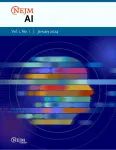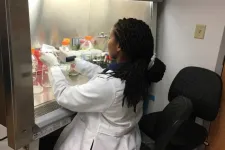(Press-News.org) Anesthesiologist and global health expert Dr. Gunisha Kaur and her research team recently won a prestigious National Academy of Medicine (NAM) Catalyst Prize.
The Catalyst Awards are a branch of the Healthy Longevity Global Competition that seeks to expand the human healthspan—usually defined as how many healthy years a person lives—by rewarding cutting-edge ideas to improve the physical, mental, or social wellbeing and health of people as they age. Up to 20 awards are being given this year to United States-based innovators, out of 1,100 applications received from organizations focused on “science, medicine, and health, to technology, finance, social sciences, and beyond,” NAM said.
NAM works with eight global collaborators that represent more than 50 countries and territories, all of which issued their own Catalyst Awards on the same day.
Dr. Kaur’s team won the prize for its project, “Digital Solutions to Reduce Maternal Morbidity and Mortality in Refugee Women,” which aims to clinically train and validate a digital refugee health system. The prize comes with $50,000 of seed funding and networking opportunities and makes them eligible for the next phases of the competition. Two other phases of application and awards follow, with a $5 million grand prize.
Project lead author Dr. Kaur is an associate professor of anesthesiology at Weill Cornell Medicine, director of the Weill Cornell Medicine Human Rights Impact Lab, and a medical director of the Weill Cornell Center for Human Rights, which provides forensic medical evaluations to people who seek asylum in the United States. For this project, she collaborated with Stephen Yale-Loehr, a professor of immigration law practice at Cornell Law School, and Dr. Richard Boyer, an assistant professor of anesthesiology at Weill Cornell Medicine and a core director at the Human Rights Impact Lab. The lab interfaces with the Center for Human Rights, conducting research to advance the health of refugees and displaced populations.
The project involves a wearable device plus a customized app for early risk stratification and identification of gestational hypertension and preeclampsia, which are pregnancy complications.
All pregnant refugee women are at elevated risk for developing these complications because of barriers that can prevent refugees from accessing in-person health care. Dr. Kaur shared that interviews with refugee patients revealed many didn’t access health care services because they believed erroneously that doing so would violate the law. Having an expert in immigration law, such as Yale-Loehr on the team, allows them to tell refugee women that since they are pregnant, they are allowed to access care such as prenatal visit and vaccines.
“Many refugees and asylum seekers worry that if they seek medical help while pregnant, they might be deported," Yale-Loehr said. "This new research builds on prior work Dr. Kaur and I did dispelling that concern. Our website Rights4Health informs immigrants about their eligibility for public benefits.”
“Even with very few other resources, almost all or 90 percent have a cell phone, which gives us an enormous opportunity to disseminate health care information about pregnancy and prenatal visits, and vaccines,” she said.
The project also utilizes related biomarkers using predictive machine learning, ecological momentary assessments, and remote digital data for risk stratification and possible diagnosis, she said.
“Our idea is to bring health care to refugee women through the use of cutting-edge digital technologies,” said Dr. Kaur. “If we can improve health care access, we can start to look at improving disease diagnosis and treatment.”
Digital tools can help detect hypertension with high precision and can risk stratify for preeclampsia, so pregnant women with these conditions can be treated earlier in their pregnancies, she said. They have been used in landmark research studies such as the electronic Framingham Heart Study, but she wants to know exactly how they can be optimized for this patient population.
“That’s what this study is about: Can we train our digital tools to do it as well as a clinic visit?,” she said. “While these patients do not typically attend clinic visits, over 90% of them do have access to digital tools.”
This project expands on work the team has done with digital technology in the last few years, but on accelerated timeline: results need to be generated within 18 months.
Dr. Kaur remains consistently motivated about her work, she said. First, she believes it is the humane thing to do to provide refugees who have survived forced displacement appropriate and adequate medical care. Because her family came to America this way, she has a personal relationship with the medicine and science of this population and has developed a passion and drive to make a difference that manifests in this project.
“The refugees and asylum seekers that we work with in our clinic and lab are people just like you, and just like me,” Dr. Kaur said. “Recognizing that shared humanity—particularly that there is very little that distinguishes between ‘us’ and ‘them’—helps us to understand why this work is so important.”
END
Research team led by Dr. Gunisha Kaur wins 2023 National Academy of Medicine Catalyst Prize
2023-12-12
ELSE PRESS RELEASES FROM THIS DATE:
You can always become a better reader
2023-12-12
Our reading skills, and understanding of a text, depend on several factors.
“These include decoding texts, learning the letters of the alphabet, and knowing the different words and how they sound. However, vocabulary is also important,” says Professor Hermundur Sigmundsson at the Norwegian University of Science and Technology (NTNU) Department of Psychology.
He is behind a special edition of Frontiers in Psychology together with Professors Heikki Lyytinen from the University of Jyväskylä and Elena L. Grigorenko from the University of Houston.
Most people can learn how ...
New study sheds light on how much methane is produced from Arctic lakes and wetlands
2023-12-12
PROVIDENCE, R.I. [Brown University] — When it comes to greenhouse gases, methane is one the biggest contributors. Not only is it massively abundant — it’s about 25 times more potent than carbon dioxide at trapping heat in the atmosphere.
That makes tracking methane emissions critically important, and nowhere more so than in the Arctic, which is now the fastest warming part of the globe. A new study conducted at Brown University helps shed light on the actual atmospheric methane emissions from Arctic ...
Nearly 40% of Type 2 diabetes patients stop taking their second-line medication
2023-12-12
Two-thirds of patients discontinued their medication, switched to a different medication class or intensified their treatment
Discontinuation was higher (50%) among GLP-1 RA drugs, which are linked to gastrointestinal side effects
Findings could have implications for patients taking GLP-1 RAs to treat obesity
First large U.S. study to show such high discontinuation rates
CHICAGO --- Most patients with Type 2 diabetes will end up needing to add a second-line medication after metformin — the go-to primary drug for glucose management — ...
Black Medicare patients less likely to be referred for home health care
2023-12-12
Waltham — December 7, 2023 —
At discharge from the hospital, Black Medicare beneficiaries are less likely to be referred for home health care (HHC), compared to white patients reports a survey study in Medical Care. The journal is published in the Lippincott portfolio by Wolters Kluwer.
The disparity in referral for HHC among Black Medicare patients appears greatest among those with low "readiness for discharge" scores, according to the new research, led by Olga Yakusheva, PhD, of University of Michigan School of Nursing and School of Public Health.
Does ...
NEJM AI to educate clinicians about artificial intelligence applications in medicine
2023-12-12
BOSTON, December 12, 2023 — NEJM Group, publisher of the New England Journal of Medicine, today announced the launch of its newest title, NEJM AI, a peer-reviewed, monthly journal dedicated to the latest research and application of artificial intelligence (AI) and machine learning in medicine. In addition to original research articles, the journal publishes reviews, policy perspectives and educational material for clinicians, scientists, health care leaders, policy makers, regulators, and executives with pharmaceutical, device-manufacturing and technology companies. Benchmark data sets and protocols are ...
FAU lands USDA $1 million grant to create South Florida’s first microbiome innovation center
2023-12-12
In addition to being one of the largest, most diverse metropolitan areas in the world with a population of 6.1 million, South Florida hosts more than 9.7 million acres of farmland with a revenue of more than $7 billion in recent years. However, climate change, extreme weather events, poor soils, pests and disease, and workforce shortages present unique challenges in this region.
To address a critical need to train a diverse workforce with new sets of tools and skills to confront these emerging challenges, ...
Open Science momentum grows stronger in Canada with a new commitment by its largest mental health teaching hospital
2023-12-12
The Centre for Addiction and Mental Health (CAMH), Canada’s largest mental health teaching hospital in the country is pleased to announce that it has entered into a partnership with the Tanenbaum Open Science Institute (TOSI) at McGill University’s The Neuro, joining a growing alliance Canadian institutions changing research practices in neuroscience. This important endeavour is supported by a $1M commitment from the Tanenbaum Open Science Institute and an equivalent commitment by CAMH.
As part of its commitment to Open Science, CAMH is formally adopting a set of Open Science Principles to foster collaboration and the sharing of mental health ...
A lifesaving chain, a global first: Penn Medicine sets a worldwide record with 100 kidney paired donation transplants in a year
2023-12-12
PHILADELPHIA— For thousands of people around the world waiting for a kidney, paired exchange serves as a beacon of hope. One person's willingness to undergo the act of Kidney Paired Donation (KPD) often sets in motion a chain of beautiful and selfless acts, where individuals give and receive the chance for a better life. After completing its 100th KPD transplant in a 12 month period, the Penn Transplant Institute now holds the world-wide record for the most KPD transplants in a year.
More than 90,000 people in the United States are waiting to receive a kidney transplant, with average waits to receive a kidney from a deceased donor ...
New 'atherosclerosis atlas' sheds light on heart attacks, strokes
2023-12-12
University of Virginia School of Medicine researchers have created an “atlas of atherosclerosis” that reveals, at the level of individual cells, critical processes responsible for forming the harmful plaque buildup that causes heart attacks, strokes and coronary artery disease.
Atherosclerosis, or hardening of the arteries, affects half of Americans between ages 45 and 84, and many don’t even know it, the National Institutes of Health reports. Over time, fatty plaques build up inside the arteries, where they can slow blood flow. When they break loose, they can be deadly, triggering strokes and heart attacks.
Doctors ...
Equity in cannabis research
2023-12-12
In a Perspective, researchers call for equity in cannabis research as the field rapidly expands. When marijuana was illegal across the United States, enforcement and penalties were disproportionately heaped upon communities of color. Today, cannabis remains federally illegal and unequal enforcement continues, while profits from the “green rush” of state legalization are in many cases flowing to wealthy white men. Renée Martin-Willett and an interdisciplinary team of colleagues propose a way forward for cannabis research that acknowledges this history of discrimination and misuse of institutional power and embraces ...



